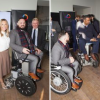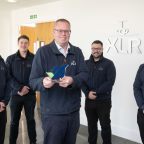
Paralympian unveils revolutionary new wheelchair
PARALYMPIAN Phil Eaglesham has invented a revolutionary new affordable wheelchair that lets users see eye to eye, with backing from the family of Dragons’ Den’s Deborah Meaden.
Corporal Eaglesham helped to create the new style of mobility device after catching Q Fever while serving in Afghanistan and having to use a wheelchair himself.
He found that existing designs were impractical, unwieldy, too low down and incompatible with modern living and so he determined to create a revolutionary new wheelchair that could help users live their lives more fully and to feel ‘abled, not disabled'.
The new ‘Victor' wheelchair prototype was unveiled yesterday at a special launch at the Imperial War Museum (IWM) in London, a launch attended by serving and ex-servicemen and women, wheelchair users and opened by celebrity presenter of the Paralympics JJ Chalmers.
It was an emotional unveiling and demonstration where some potential users were in tears, there was unrestrained joy from others and relief and gratitude that it had been invented from most. Many had the chance to use the Victor wheelchair for the first time.
Designers from the University of Sheffield's Advanced Manufacturing Research Centre have worked with Corporal Eaglesham to take cutting-edge space age technology and Boeing engineering to re-invent the wheelchair.
The ‘Victor' chair can raise to eye level, turn virtually on the spot, is narrow enough to get through doors, will be in a more affordable price bracket than others on the market and could change the lives of millions of users for the better.
"Being in a wheelchair made me see first hand the challenges faced and so I tried out loads of solutions on the market but none of them tackled everyday problems that I, and other mobility device users, have on a daily basis," said Corporal Eaglesham at the launch.
"So we decided to team up with experts from the University of Sheffield to design and build an completely new type of wheelchair and price it at a point where it could be accessible to everyone."
The new wheelchair aims to overcome challenges such as:
1. Social Height - being talked down to when you are sitting in a wheelchair is a frustrating experience as people treat you as ‘disabled'.
2. Mounting Kerbs - most devices cannot climb a simple pavement so going from road to the path or even just crossing the road is often more of a challenge than it needs to be.
3. Inside and Out - several devices will not fit through a standard door and therefore the users require numerous vehicles to get through a full day - e.g. one for home, one to go to the shops etc.
4. Sitting at a table - several mobility devices have front steering and controls so the user cannot easily and discreetly pull up to a table.
5. Look good, feel good - most mobility devices on the market have had little or no design input and we want our solution to make the user feel empowered.
6. Modular - as users' conditions decline there is often a need for modifications resulting in a new device being required. A modular system will allow the customisation to be applied as required on the existing device.
Corporal Eaglesham is originally from Northern Ireland and served in Afghanistan as part of Taunton-based 40 Commando and caught the illness on his last day of a six month deployment.
The bacterial infection Q Fever leads to physical debilitation which, in Phil Eaglesham's case, means he has been so weakened that he cannot lift a coffee cup or play with his children and is confined to a wheelchair. The physical and emotional devastation wrought by Q Fever led him to consider killing himself two years ago so that he would no longer be a burden to his wife and three sons.
On return from Afghanistan he had customised a Segway by putting a seat on it in order to be at the same height as his wife and friends - but soon found he didn't have the core strength to hold himself up, and also discovered that it wasn't legal on roads and footpaths in the UK.
That led him to designing the elevating wheelchair. It is still in the development stage and yesterday's (28th Nov) launch is to help to raise the £600,000 needed to build two fully working prototypes through Crowdcube, a shares-based fundraising platform.
"In October 2010, Helmand Provence, Afghanistan my life changed forever," he explains. "Since then I've struggled with the why's and what's, as to the nature of ‘why me?!'
"As my illness deteriorated I began to find the reason: that I was given an opportunity not only to change my life path but also the lives of possibly millions of disabled people the world over.
"With the support I've had, it became vital to find like-minded people who had the foresight of giving disabled people the ability to live in an able-bodied environment, rather than constantly trying to adapt or structurally change everything."
Corporal Eaglesham, who is originally from Northern Ireland and who now lives in Taunton, met businessmen and father of Dragons' Den's Deborah Meaden, at a private charitable function and the two immediately struck up a rapport.
Mr Meaden helped to introduce Corporal Eaglesham to engineers from his own Alma Mater, the University of Sheffield. The team at the Advanced Manufacturing Research Centre re-invented the wheelchair, designing it not only to rise up to ‘social height' but also to mount kerbs and small steps and turn on the spot. It will reduce the need for costly adaptations to kitchens and bathrooms and will help countless lives.
"To take a disabled person back to a social height, to aid social interaction but also increase independence has been key," says Corporal Eaglesham. "The whole team have worked endlessly to produce what we now call VICTOR, to enable not only myself but those in varying degrees of circumstances to conquering horizons that we've previously avoided at all costs. I'm excited for my future using Victor, but more excited about the possibilities that it will give others.
"From the moment I met Philip and Julie I found their courage in adversity inspirational," says Brian Meaden.
"After a long career in business this project has given me the greatest level of satisfaction in that it brings together an exciting business investment opportunity with the satisfaction of knowing that our end product will change and improve countless lives.
"This is a once-in-a-lifetime opportunity to invest in something that will change lives forever. There clearly is a demand for this kind of product and the demand is unsatisfied."
Deborah Meaden, who is backing the project, said: "This revolutionary, innovative new design of wheelchair is just the kind of game-changing technology that will make a permanent, positive and irreversible difference to users.
"That it has been born out of the hands-on, real-life experience of someone like Phil makes the solutions it offers even more pertinent and relevant. I'm delighted to be supporting this project and I am sure that in ten years' time we will look back and wonder why we ever made mobility devices any other way."
The event was attended by a number of veterans and wheelchair users who were openly emotional about the possibility of using an affordable chair that raises them up to eye level.
This year Corporal Eaglesham represented Ireland in the Paralympics Games in Rio in Air Rifle Shooting. It is hoped that the new prototype wheelchair will be ready in time for next year's Invictus Games for disabled servicemen in Toronto.
Corporal Eaglesham has been supported in his endeavours by The Royal Marines Charity and Help for Heroes. To invest in the product or for more information please contact info@victormobility.com or visit their website on www.victormobility.com














